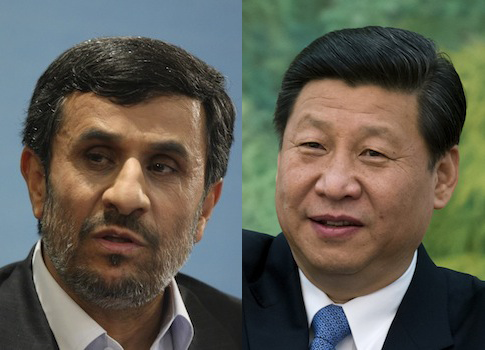China’s government provided goods and expertise for Iran’s nuclear program in the past and also gave Tehran’s Islamist regime missiles and other arms as part of the nations’ anti-United States policies, according to a congressional commission report made public Thursday.
"The authoritarian governments centered in Beijing and Tehran share an animus towards ‘hegemonism’ and a fear of internal instability," the report prepared for the U.S.-China Economic and Security Review Commission states.
"In recent decades the United States, supported by regional allies and security partners, has represented the principal hegemonic threat to Iran and China in two different regional contexts: the Persian Gulf and the Western Pacific."
The 95-page report, "China-Iran: A Limited Partnership," was produced for the commission by the intelligence contractor CENTRA Technology and dated October 2012.
China provided nuclear assistance to Iran in the 1990s and promised to halt its support in 1997. However, the report said there are indications Beijing has continued to provide covert assistance to Iranian nuclear programs.
On missile experts, the report said, "China has continued measured support to Iran’s defense programs."
Recent transfers include several export versions of Chinese missiles, including C-705 anti-ship cruise missiles.
"U.S. government sanctions of multiple Chinese companies over the past two years are further evidence that some technology transfers continue," the report said.
The arms trade and China’s desire to buy energy resources from Iran are Beijing’s main reasons for not supporting international sanctions against Iran for its illicit uranium enrichment program, the report said.
The report outlines extensive cooperation between China and Iran on nuclear weapons as Beijing sought "opportunities to gain commercial benefit from its extensive military nuclear capacity," the report said.
However, China halted nuclear cooperation with Iran to preserve relations with the United States.
Equipment with both dual-use civilian and military purposes included a 27-kilowatt thermal (kWt) miniature neutron source and a small calutron—an electromagnetic isotope separation (EMIS) device, elements useful for uranium enrichment.
China also provided support for Iran’s Esfahan nuclear center.
Intelligence reports from the 1990s triggered fears in the West. The report said worries "about Iran’s nuclear program—and thus about Beijing’s assistance—was increasing rapidly."
Also, in 1991 Iran secretly imported 1.6 metric tons of uranium products from China, including about a metric ton of uranium hexafluoride (UF6), which is used in centrifuges to make highly enriched uranium, the report said.
According to the report, China appeared to oppose Iran’s nuclear policy in response to U.S. pressure but "many in China even see Iran’s nuclear development as a positive in that it counters U.S. influence and provides China with strategic leverage."
Intelligence reports continue to suggest that China or Chinese entities are covertly providing assistance to Iran’s nuclear program, the report said, based on the imposition of sanctions on Chinese companies or people for weapons of mass destruction transfers to Iran.
For example, Li Fang Wei and the LIMMT Economic and Trade Company, Ltd of Dalian China—sanctioned by the U.S. Treasury Department in June 2006—purchased materials for various subsidiaries of Iran’s Defense Industries Organization, which is involved in nuclear development.
"Although the specific end use was not known, the materials were export controlled and potentially could be used for nuclear, ballistic missile, or military programs," the report said.
Recently another Chinese broker purchased 20 tons of maraging steel from a U.S. firm, claiming the material was to be used in the manufacture of a "magic horse."
Mark Dubowitz, a specialist on Iran-China relations at the Foundation for Defense of Democracies, said China has provided a hospitable environment for Iran to acquire and transfer a range of arms proliferation-related goods.
"The substantial diversion of these goods through China to Iranian end-users or Iranian intermediaries fits the definition of a 'Destination of Diversion Concern' under the Comprehensive Iran Sanctions Accountability & Divestment Act 2010," Dubowitz said. "The U.S. Congress should pass legislation that formally designates China as a 'Destination of Diversion Concern.' A legislative designation by Congress will give the administration leverage to persuade Beijing to crack down on these practices."
U.S. intelligence reports to Congress also raised new questions about continued Chinese nuclear assistance by indicating since 2000 "some interactions between Chinese and Iranian entities that have raised question about [China’s] ‘no new nuclear cooperation’ pledge" since 1997, the report said.
The latest report to Congress in 2011 said Chinese transfers continued but there was no specific reference to Iran or nuclear assistance.
"There is no publicly available information indicating that China or Chinese entities have directly aided the most sensitive parts of Iran’s nuclear program—uranium enrichment and the ‘possible military dimensions’ addressed in numerous IAEA reports," the report.
However, Chinese uranium hexafluoride in covert enrichment projects were detected in 1998 and 2002, the report said.
Additionally, the Chinese have provided an array of missiles and related technology to Iran, the report said. They included HY-2 Silkworm anti-ship missiles as well as dozens or perhaps hundreds of missile guidance systems and computerized machine tools to Iran sometime between mid-1994 and mid-1995.
China sold Iran advanced C-801 and C-802 anti-ship cruise missiles in the mid-1990s.
Also, China’s Great Wall Industry Corp. provided the entire telemetry and missile flight-testing infrastructure to support the development of the Shahab-3 and Shahab-4 medium range missiles.
China also supplied Iran with modified Chinese FL-7 antiship missiles that can be fired from either helicopters or fast attack craft.
